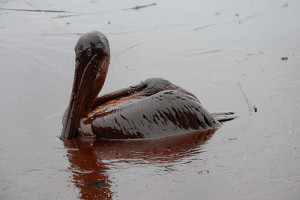We have much more to do and your continued support is needed now more than ever.
3-mile Oil Slick in the Gulf Confirmed as BP Oil from 2010 Spill

A 3-mile oil slick detected in the Gulf last month has been confirmed as oil from the 2010 Gulf oil disaster, according to Coast Guard reports. The slick illustrates what NWF has said all along—that the long-term effects of the spill are unknown and ongoing, and that BP must be held accountable to the fullest extent of the law until the ecology and economy of the Gulf has been restored.
Drilling experts are claiming it’s unlikely that BP’s Macondo well is leaking again and the Coast Guard feels the residual oil “does not pose a risk to the shoreline,” but the slick is nonetheless a cause for concern for the wildlife and ecosystem of the Gulf—especially considering recent media reports suggesting BP has proposed a settlement offer that is significantly less than half of what it would face at trial.
Alarmingly, BP is attempting to once again shirk responsibility for causing the largest environmental disaster in U.S. history, purportedly offering a sum less than $20 billion. An amount so low would be inadequate to repair the Gulf and would allow the oil giant – which netted $25.7 billion in 2011 – to escape paying what is required by law, what it can afford and what is fair in a case with such egregious environmental damage.
Hold BP Accountable for Ongoing Effects to Wildlife and Habitat
Yesterday, NWF called on Attorney General Eric Holder to ensure BP is held fully responsible for its involvement in the 2010 Gulf oil disaster. We continue to not only monitor the spill’s effects on the ecosystem, but to follow up on holding BP responsible. Because despite BP’s advertising campaigns to the contrary, the Gulf is still reeling from the oil disaster.
We may not know the full impact of the oil on the Gulf for years to come, but we do know that the oil:
- Continues to show up on beaches in the form of tar balls and tar mats;
- Severely impacted bird nesting habitat;
- Negatively affected endangered sea turtles;
- Is probably at least partly responsible for a spate of dolphin deaths;
- Sped marsh erosion in heavily impacted areas;
- May have harmed plankton, a key link in the ocean food web.
It’s time for BP to stop stalling, pay up and make the Gulf whole. The sooner full payment happens, the sooner environmental and economic restoration can begin for this region. We owe it to our Gulf of Mexico – one of our national treasures – to make sure BP does right for the people, wildlife and habitat of this region.
Please like & tweet this post to help spread the word that despite BP’s big money propaganda, the Gulf’s not clean and the job’s not done!






















